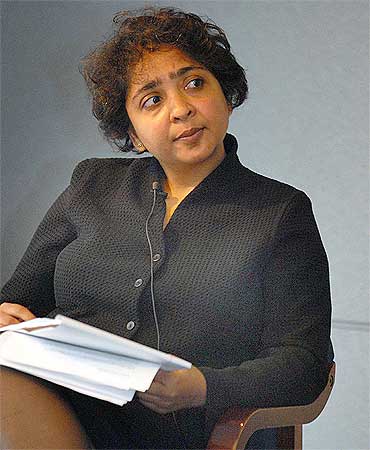
Despite the Congress coming to power in New Delhi, experts on Indian politics on Thursday said in New York that the election results 'read across the board' as an overwhelming victory for India's oldest political party should not be construed as a national faith in the party.
The experts that included Kanchan Chandra, associate professor, Wilf Family Department of Politics, New York University, Pramit Palchaudhuri, senior editor, The Hindustan Times newspaper and an International Council Member of Asia Society and Sanjay Ruparelia, Assistant Professor of Politics, New School for Social Research and Faculty Fellow, the India China Institute felt that the Congress-led has many challenges ahead.
"'The first point I would like to make is this is really not how these results should be read. While the Congress has made a massive jump in terms of seats from 140 something in 2004 to 206 seats now, there has been a very small shift in votes,' said Chandra.
'The Congress' votes increased by two to three percent and the Bharatiya Janata Party's votes deceased by two percent. Actually, the votes for the major parties in the last two or three elections have been largely stable but you see massive fluctuations in the seats," she said.
Text: Suman Guha Mozumder

Giving an example, she said, despite the Left parties' rout, the votes for the Left remained exactly the same though the seats came down.
"So, this is not a consolidation of the votes behind the Congress or the revival of the Congress as many believed popularly, but is evidence of the utter unpredictability of the results from a highly fragmented coalition environment in Indian political situation,' Chandra, a 2009 Guggenheim Fellow, said.
"I certainly do not see a groundswell of support for the Congress. There are still 38 or 39 parties in Parliament. What we should be seeing is a high-level of fragmentation that continues," Chandra, who took many questions from the audience, said
She said that one good thing is, "No Congress partners have big number of seats to blackmail the party."

"But there is a good chance of continuing to see fair amount of instability and continuing fragmentation as regional parties continue their regional aspirations," she said. 'I think it is too early to talk about a consolidated and a stable Congress government.' she said.
The reasons, she said, are many, like the Trinamool Congress in West Bengal would like to see the Left Front Government dismissed and the Samajwadi Party would like to see the Mayawati government in Uttar Paradesh dismissed.
"We should certainly expect a stable government over the next few years and till the next election but I think this can be associated with social stability and economic policy,' she said.

Asked by Hunter College professor whether the verdict was a shift away from identity politics to the politics of governance, Chandra said she did not think of it as so much as a shift but the 'transformation of the scope' in which identity politics matters.
"I think we are beginning to see a bifurcation of popular politics where in urban areas we see more people gain from the shrinking of the state in terms of the economic growth," she said.
'In rural areas, there is a pronounced stability of identity politics as the states expand There, particularly with social insurance schemes, identity has become very important to have those insurance schemes implemented,' she said.
On whether the Manmohan Singh-led government will be able to take the Indo-US relations further, Pal Chaudhuri said though the government has majority in the Lok Sabha, it does not have the same majority in the Rajya Sabha and that would make it difficult to pass legislations.